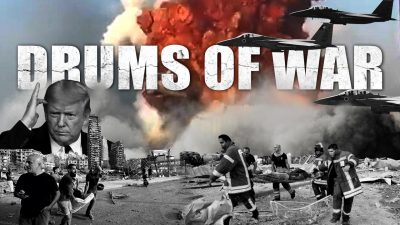Video: War Drums Beat in the Middle East and the Beirut Explosion

On the evening of August 4th, a massive explosion rocked the port of the Lebanese capital of Beirut, causing devastating damage and leaving thousands of casualties. The explosion sent a shockwave across the city and blew out windows up to 10 kilometers away. It was felt as far away as Cyprus in the Mediterranean Sea.
As of the morning of August 5th, the number of reported fatalities exceeded 100, with at least 4,000 people reported injured. At least 48 staff members of the United Nations and 27 members of their families were among the injured. 10 rescuers involved in the operation to contain the damage and to help people have been reported killed.
Initial reports suggested that the explosion may have been caused by an incident in the firework storage area. However, later, Lebanon’s Prime Minister Hassan Diab said that 2,750 metric tons of ammonium nitrate, which is typically used as an agricultural fertilizer, had been stored for six years at a port warehouse without proper safety measures, “endangering the safety of citizens.”
This statement was backed by General Security chief Abbas Ibrahim, who said a “highly explosive material” had been confiscated years earlier and stored in the warehouse, just minutes’ walk from Beirut’s shopping and nightlife districts.
It is still unclear what caused the explosion itself thus laying the ground for various speculations in mainstream media outlets and on social media platforms. In particular, reports suggested that a number of Hezbollah members were in the port area at the moment of the explosion. This immediately caused reports that this may have been a result of some Israeli attack, for example sabotage actions or a somehow unnoticed missile strike, and that the site of the explosion was in fact a part of the Hezbollah military infrastructure.
The Israeli Defense Forces did not officially comment on these speculations. Israeli media, which are often eager to promote supposed Israeli military victories, claimed that Israeli forces did not attack Beirut. In their turn, Hezbollah denounced reports that the explosion happened on one of their sites saying that there was no Israeli attack on August 4.
Nonetheless, it seems that the US leadership has a quite different point of view. Commenting on the situation after a meeting with military officials, President Donald Trump claimed that the incident was an attack.
“They seem to think it was an attack. It was a bomb of some kind,” Trump said.
Whatever the real cause of the tragedy turns out to be, the Beirut explosions have already fueled tensions in the region. And despite comments by Hezbollah and Israeli media that it was not a military incident, the warring sides are actively accusing each other. Comments by the US President about a supposed attack on the Beirut port do not make the situation any easier.
Taking into account the recent series of military incidents on the Israeli-Lebanese contact line, and in the Israeli-occupied area of the Golan Heights, any new border provocation may easily lead to a larger escalation. The years of war propaganda and military confrontations together with increased tension within Israeli and Lebanese society respectively have already created conditions in which a further, even small, military incident may appear to be enough to provoke a larger war in the region. This large war is in no interest of Tel Aviv or Hezbollah because it will obviously have a devastating impact on both Israel and Lebanon. In this light, it is especially interesting that the Trump administration is making statements that would contribute to this scenario. There is a chance that in a time of a deepening social and political crisis in the US on top of a complicated economic situation in the runup to the next US Presidential election, some hotheads may believe that a new, theoretically ‘victorious’ war in the Middle East, could help them to remain in power.
*
Note to readers: please click the share buttons above or below. Forward this article to your email lists. Crosspost on your blog site, internet forums. etc.
SUPPORT SOUTHFRONT:
PayPal: [email protected], http://southfront.org/donate/ or via: https://www.patreon.com/southfront

